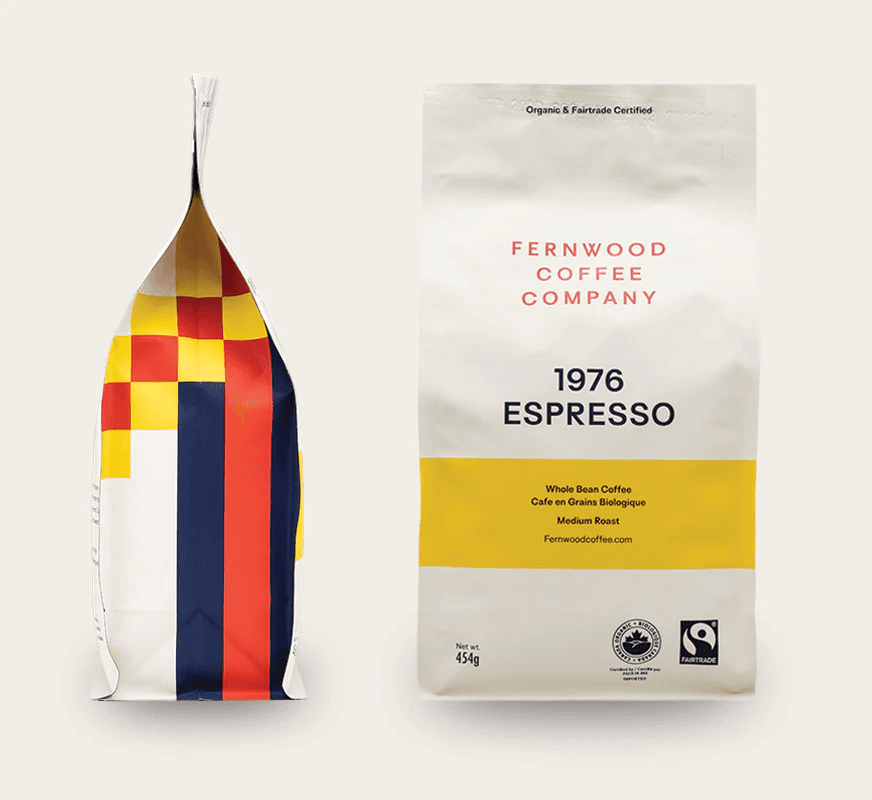Th3rdwave Directories
Cafés
Roasters
Coffees
Guides
Awards
Th3rdwave Coffee Club
Subscription
Gift subscription
Current edition
Past editions
Shop
Advent Calendar
Coffee games
Th3rdwave Wallet
Loyalty cards
Gift cards
Th3rdwave for cafés
Th3rdwave for roasters
Get free coffee
1976 Espresso
1976 Espresso is a signature blend. It has been created and roasted to t has been created for lovers of adventurous espresso, and complex-tasting filter coffee.
The blend is made up of two key origins. The first is a Peruvian from the CECANOR group 800 women producers. The group was created in 2004 to gain visibility and a voice inside their community by separating their co ee production from men, who traditionally hold the economic power in the industry. They developed a market for women-produced coffee to serve as an important vehicle for social change and the empowerment of poor, marginalized women coffee farmers.
The second is a Guatemalan from Huehuetenango. It is sourced from the 614 farmers of the ASOBAGRI Coop. The coop was founded in 1989 by 20 K'anjob'al Mayan coffee and cardamon farmers. ASOBAGRI trains agricultural promotors, who teach their member farmers about organic production methods, such as creating compost from coffee cherry waste. Through this practice, they were able to get the Fair Trade certification in 1999.
The result is a coffee with notes of chocolate, caramel and orange zest.
The blend is made up of two key origins. The first is a Peruvian from the CECANOR group 800 women producers. The group was created in 2004 to gain visibility and a voice inside their community by separating their co ee production from men, who traditionally hold the economic power in the industry. They developed a market for women-produced coffee to serve as an important vehicle for social change and the empowerment of poor, marginalized women coffee farmers.
The second is a Guatemalan from Huehuetenango. It is sourced from the 614 farmers of the ASOBAGRI Coop. The coop was founded in 1989 by 20 K'anjob'al Mayan coffee and cardamon farmers. ASOBAGRI trains agricultural promotors, who teach their member farmers about organic production methods, such as creating compost from coffee cherry waste. Through this practice, they were able to get the Fair Trade certification in 1999.
The result is a coffee with notes of chocolate, caramel and orange zest.
1976 Espresso is a signature blend. It has been created and roasted to t has been created for lovers of adventurous espresso, and complex-tasting filter coffee.
The blend is made up of two key origins. The first is a Peruvian from the CECANOR group 800 women producers. The group was created in 2004 to gain visibility and a voice inside their community by separating their co ee production from men, who traditionally hold the economic power in the industry. They developed a market for women-produced coffee to serve as an important vehicle for social change and the empowerment of poor, marginalized women coffee farmers.
The second is a Guatemalan from Huehuetenango. It is sourced from the 614 farmers of the ASOBAGRI Coop. The coop was founded in 1989 by 20 K'anjob'al Mayan coffee and cardamon farmers. ASOBAGRI trains agricultural promotors, who teach their member farmers about organic production methods, such as creating compost from coffee cherry waste. Through this practice, they were able to get the Fair Trade certification in 1999.
The result is a coffee with notes of chocolate, caramel and orange zest.
The blend is made up of two key origins. The first is a Peruvian from the CECANOR group 800 women producers. The group was created in 2004 to gain visibility and a voice inside their community by separating their co ee production from men, who traditionally hold the economic power in the industry. They developed a market for women-produced coffee to serve as an important vehicle for social change and the empowerment of poor, marginalized women coffee farmers.
The second is a Guatemalan from Huehuetenango. It is sourced from the 614 farmers of the ASOBAGRI Coop. The coop was founded in 1989 by 20 K'anjob'al Mayan coffee and cardamon farmers. ASOBAGRI trains agricultural promotors, who teach their member farmers about organic production methods, such as creating compost from coffee cherry waste. Through this practice, they were able to get the Fair Trade certification in 1999.
The result is a coffee with notes of chocolate, caramel and orange zest.
Coffee origin
Country
Peru
Region
Various
Variety
typica, catimor, bourbon, colombia, villa sarchi
Altitude
1000 - 2050 m
Farm
800 women producers
Producer
CECANOR
Roast level
Medium
Process
washed
Show all coffee origins
Tastes like
🍫
chocolate
🍮
caramel
🍊
orange zest
Community reviews
🙂
3.3 Very Good
4 Reviews
Show all reviews
Recipes

French Press by Drop Coffee
French press

Pour Over by Sorellina
Pour over

AeroPress by Spectrum Coffees
AeroPress
Check out more in the App






